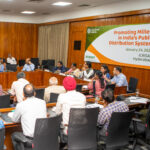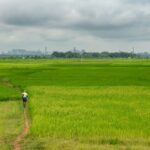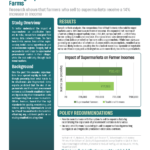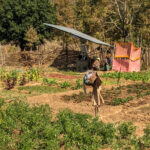Tag: Agricultural Transformation, Food Systems & Nutrition Transition

Weighing the Price of Oil Palm in Nagaland
David (name changed) is one of the few Naga farmers who actually works his farm, where he grows oil palm. Most other landowners appoint “caretakers” to look over their land. David is also a part-time social worker and a grassroots…

Behind the App: Life as a Gig Worker in India
“Is this Ms. Sunita speaking?” I asked, trying to keep my voice steady. After her quick confirmation, I explained that I was outside with her order—somewhere near the intersection of her residential colony, though the app’s location marker danced uncertainly…

Smart Foods for Smarter Policies: Millets in India’s Public Distribution System
As India intensifies efforts to fight hunger and malnutrition, the Tata-Cornell Institute for Agriculture and Nutrition (TCI) and the International Crops Research Institute for the Semi-Arid Tropics (ICRISAT) are helping Indian policymakers with evidence-based strategies to include millet in the…

Chhattisgarh Can Reduce Ag Emissions Through Diversification
India has made enormous progress against hunger by incentivizing the production of staple grains like rice and wheat. Yet, as climate change advances, the country’s dependence on rice is becoming a burden due both to its large environmental footprint and…

Promoting Agricultural Diversification and Climate Resiliency in India
This special policy brief estimates the potential reduction in methane gas emissions from the diversification of agriculture in Chhattisgarh, India. The analysis provides policymakers with information regarding pathways for combatting climate change by reducing agricultural emissions, making Chhattisgarh’s agricultural system more resilient to the effects...

Key Takeaways from TCI’s Meeting on the Future of India’s Public Distribution System
On January 9 at the India Habitat Centre in New Delhi, the Tata-Cornell Institute (TCI) brought together a group of researchers interested in food-based safety nets to discuss future pathways for India’s Public Distribution System (PDS).
Welcoming the group, TCI…

Making Supermarkets Profitable for India’s Small Farms
This policy brief presents the results of a study examining the impact of supermarkets on smallholder farmers in India. Using field survey data collected from 795 farm households across four states representing India’s varied agroclimatic and socioeconomic regions, researchers found that farmers who sold to...

TCI Publishes 2023–24 Annual Report
The Tata-Cornell Institute for Agriculture and Nutrition (TCI) has published its 2023–24 Annual Report.
The report offers an in-depth look at the full range of TCI’s research and other activities, including projects like Zero-Hunger, Zero-Carbon Food Systems, and field research…

Diversifying Farming in Chhattisgarh: What We Know About Agriculture in the State
Rice is a cornerstone of Indian diets, where policies linked to the Green Revolution have helped it and wheat achieve dominance in cropping systems. But methane emissions from rice cultivation play a significant role in exacerbating climate change, and it…

TCI Researchers to Discuss New Book on India’s Social Safety Nets
UPDATED Oct. 25: A recording of the book talk is now available on YouTube.
The authors of The Future of India’s Social Safety Nets: Focus, Form, and Scope will discuss their new book at a “Chats in the Stacks” book…

